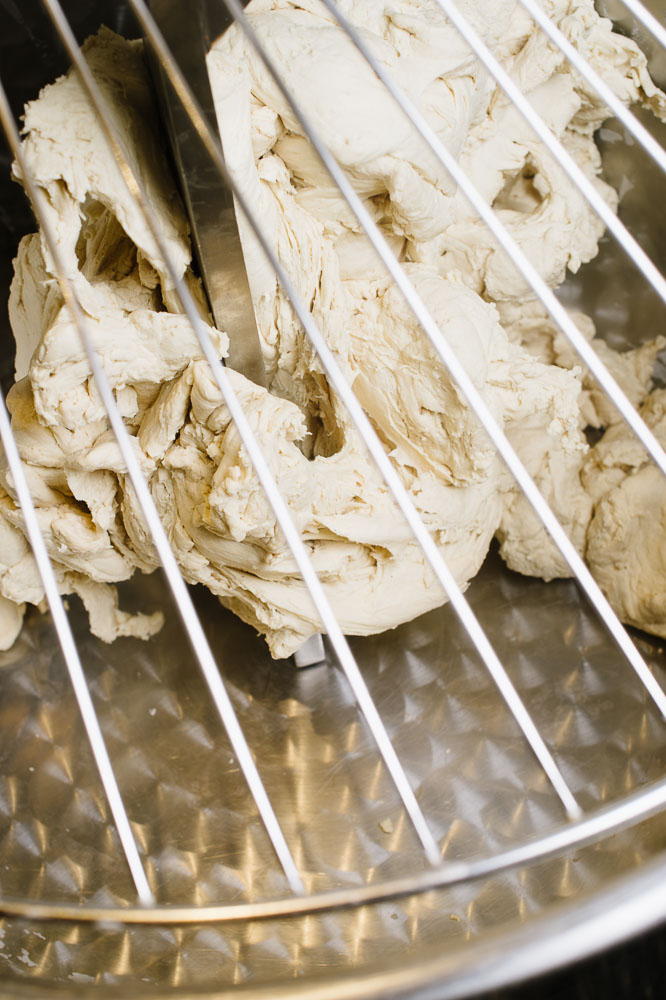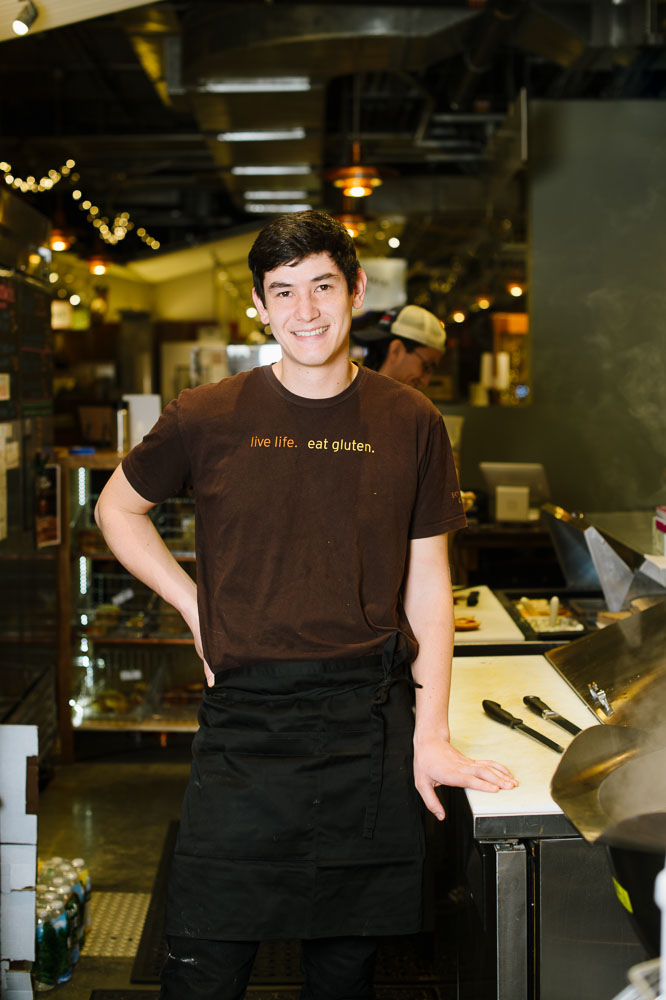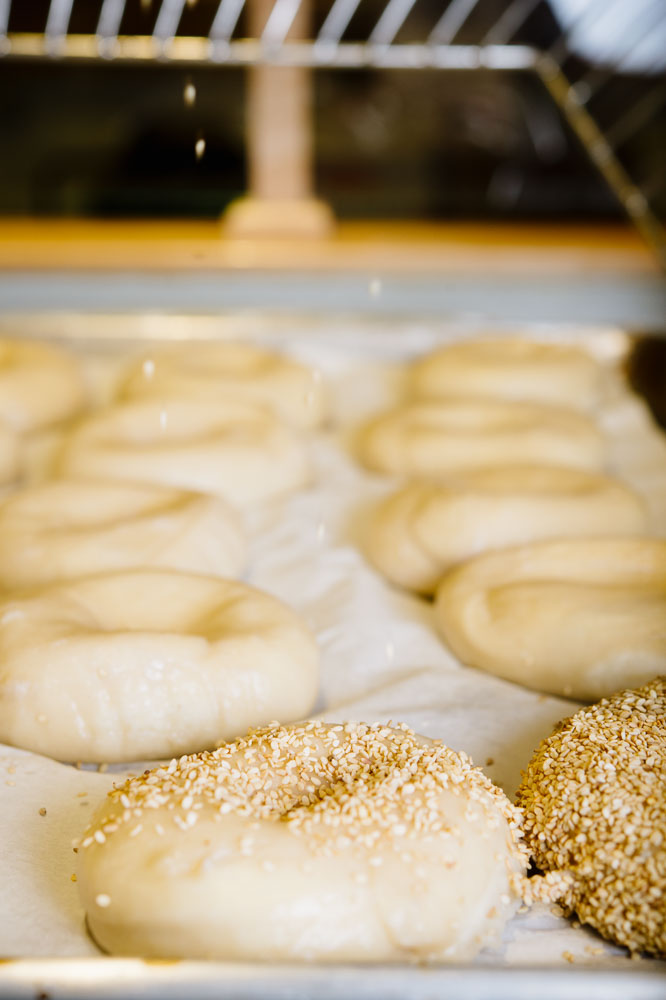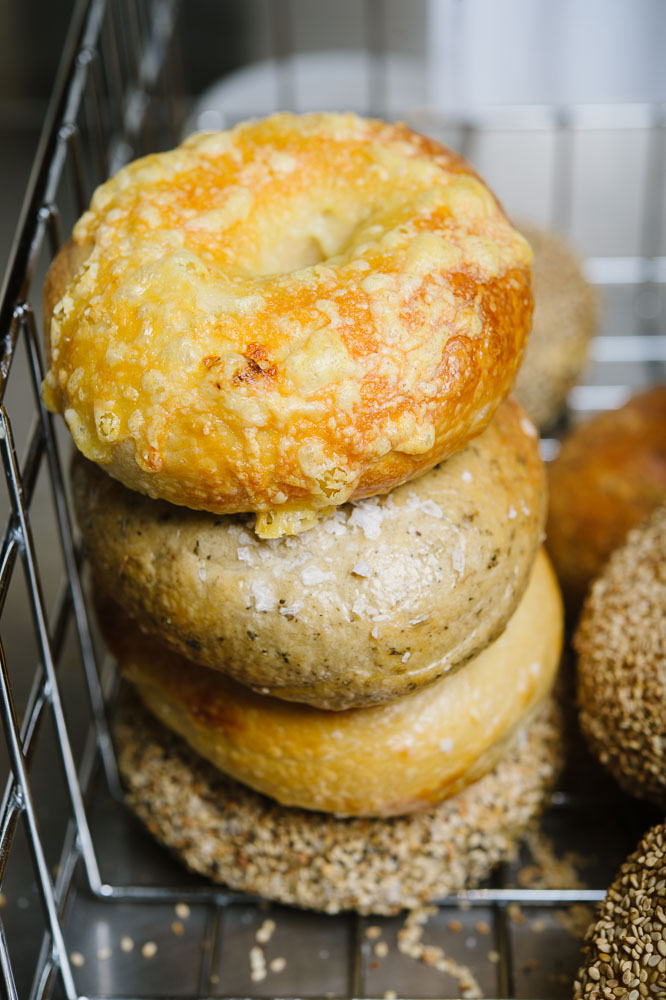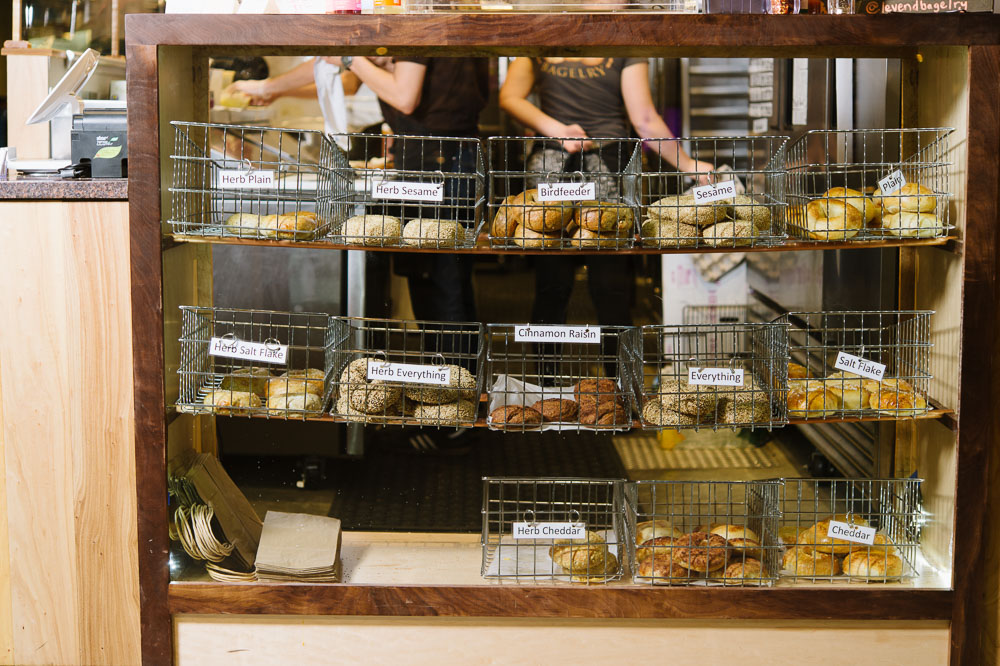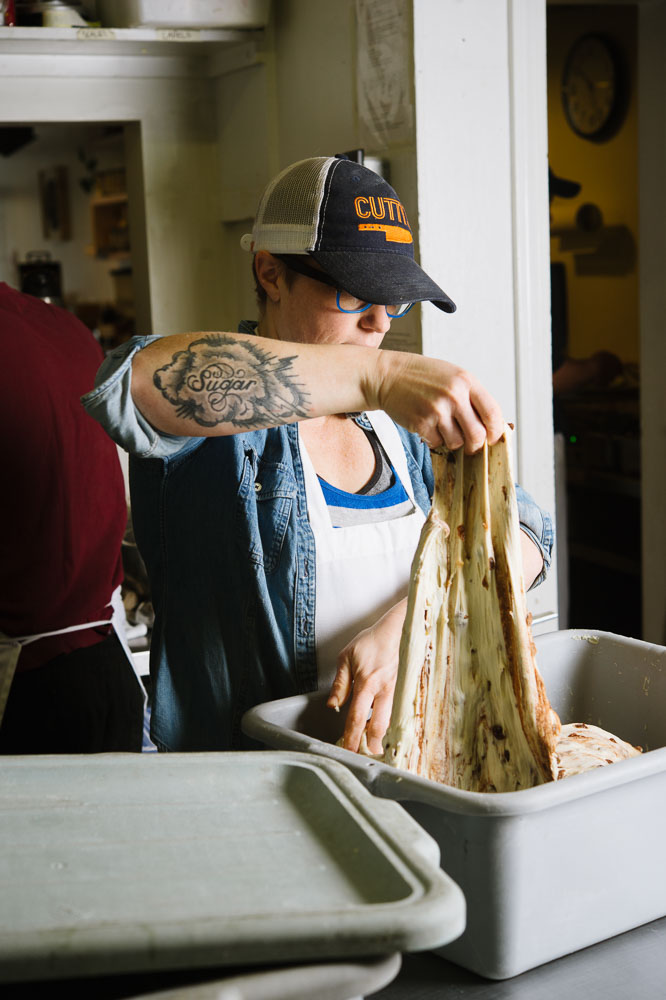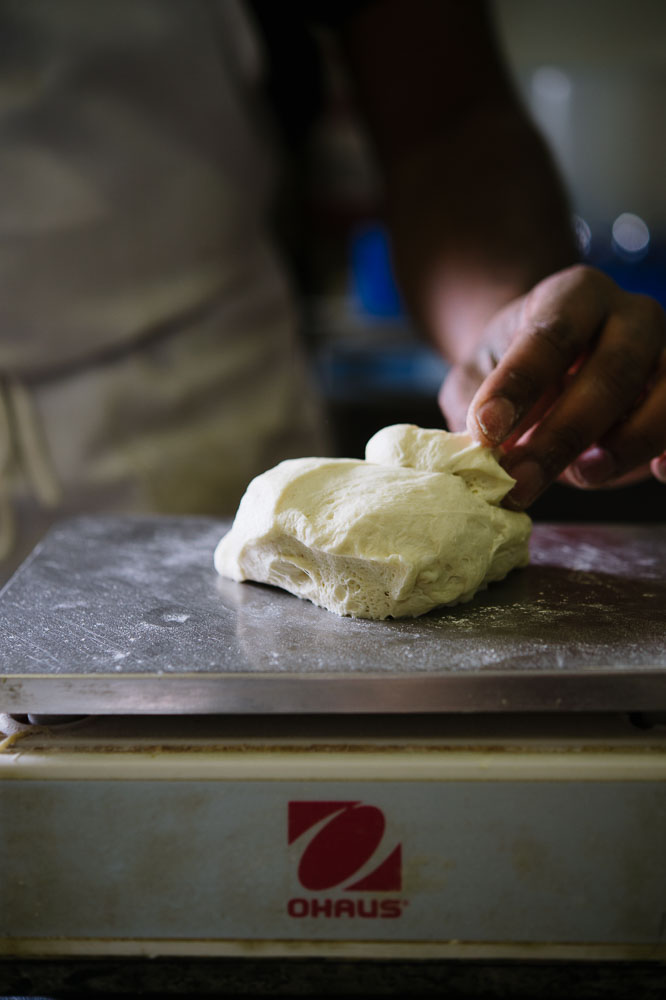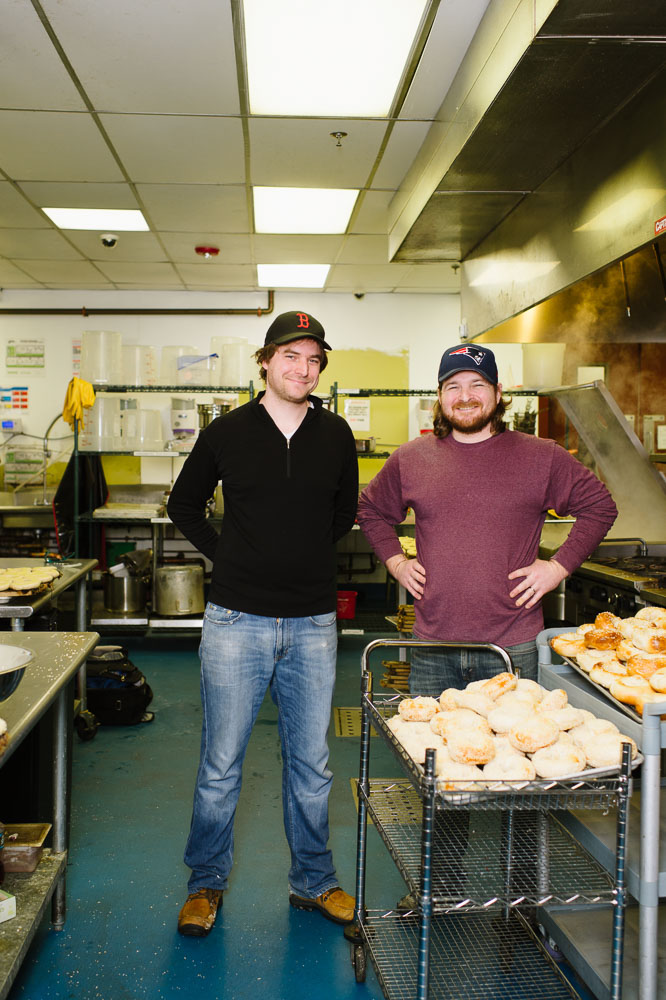Hole Foods: Inside Boston's Bagel Boom
Photos by Katie Noble
Let’s get one thing out of the way: I’m not a bagel guy. Never have been. For most of my life, I’ve been fine with an egg or a bowl of cereal in the morning. Chalk it up to my Gentile upbringing, or that bagels have always been too dense and bready for my taste, too—I never liked starting my day with a gut bomb. My bagel agnosticism defies logic, though, as I’m really more of a savory guy than sweet. Especially at breakfast.
But in tasting the bagels put out by several new shops around Boston, I’m seeing them in a new light: All along, I’ve just been eating the wrong bagels. Bags of roundish sourdough—procured from the freezer aisle—are not bagels. Neither, really, are the brick-like bagel perversions slung out by Dunkin’ Donuts and other chains. But that’s what I’ve been eating, when I’ve eaten “bagels.” It’s like saying I don’t like beer when all I’ve tried is Bud Lite.
Now I’m going to say something utterly obvious to many of you reading this: There are good—nay, great—bagels out there. Bagels I enjoy eating. And you don’t have to go to New York or Montreal to find them—they’re right here in Boston.
Bagels are having something of a moment, actually. They’re just the latest food to get the artisanal treatment, and with hand-rolled bagels being churned out in locations from Rozzie to the Seaport to Somerville, Bostonians are finally discovering what a good one’s supposed to taste like.
Is this the latest culinary craze to flame up and then out—the “new donut” or, worse, the “new cupcake?” No, and here’s why: Bagels are steeped in history, tradition and nostalgia.
The bagel may have been born in 14th century Poland as a round remix of the German pretzel. Or perhaps it was a Viennese baker who shaped dough into a circle that looked like a stirrup—beugel in German—as a tribute to the horse-loving King of Poland, Jan Sobieski. Maybe the ur-bagel was the taralli—round, cracker-like snacks flavored with fennel that go back centuries in Puglia, Italy. Some historians even trace the bagel back to the Egyptians, whose hieroglyphics suggest that they had a roll with a hole.
Whichever creation story you believe, the Jews turned bagel-making into an art form and a beloved cultural tradition. We know that Polish Jewish bakers, long restricted by anti-Semitic laws from baking white bread because of bread’s Christian symbolism, made bagels by the bushel not only to exercise their newfound freedom, but because bagels’ crusty outside gave them a longer shelf life. Here in the United States, the bagel was introduced and made popular, not surprisingly, in New York City. European Jews emigrating to the Big Apple in the late 19th and early 20th century were baking a taste of home for the diaspora, and the first bagel wholesaler would come to New Haven, Connecticut, in 1927 in the person of Murray Lender. His business would explode when he learned how to freeze his bagels and stock supermarket coolers in 1956.
Locally, Katz Bakery has been serving fresh bagels out of the same Chelsea location since 1938. Kupel’s Bakery has been doing the scratch-made, strictly kosher bagel thing in Brookline for nearly 30 years. These examples notwithstanding, the second half of the 20th century wasn’t great for authentic bagels because, as we’ve all seen, once something great hits the mainstream, someone finds a way to make it for less, a bunch at a time, and that product loses its soul.
Boston’s upstart bagelries are attempting to bring some of that soul back. The process to make a bagel is more or less the same everywhere: Water, yeast and flour are mixed and allowed to rise, rolled into balls, “proofed” and cold-fermented to activate the yeast, then boiled, brushed with egg and baked. The two-day process requires multiple sets of hands, eyes and a lot of heart.
“You can tell when something’s made with love, and you can tell when it’s conveyor belt,” says Adam Hirsch, founder of Exodus Bagels in Roslindale. “Conveyor belt when I’m starving—do it all the time. But when I’m seeking something and I’m trying to form an opinion about it? I can tell. I can tell.”
BAGELSAURUS
We appropriately begin with Mary Ting Hyatt, who was, by most accounts, the first of Boston’s new wave of bakers doing bagels.
Ting Hyatt moved to Boston in 2007 and was shocked to find so few decent bagels here. She thought, at the time, that by the time she had enough experience to start a bagel shop, someone would have beaten her to the market. She was wrong. Her home test batches turned into a weekly pop-up at Cutty’s in 2013 where she started out trying to sell the six bagels she’d made for that day. That grew to 12 a day, and soon, she was selling out of the 400 bagels she prepared for each Saturday and Sunday.
She set out to do a few things with her bagels: bulk and ferment them for longer than your typical bagel, which makes them less dense; develop a bagel that derived its flavor from the dough rather than its toppings; experiment with mix-ins, like oil-cured olives; and do breakfast sandwiches. All day.
“It’s really such a simple food,” she says. “A lot of it has to do with patience—better bread made over a longer period of time.”
On a rainy Saturday in September, despite the well-oiled service team turning out bags of bagels and sandwiches inside, the line at Bagelsaurus’s Porter Square shop extended down the street and around the corner. She’d sell most, if not all, of the 1,600 or so bagels she’d baked for the busy weekend rush.
“I still can’t believe the lines,” she says. “There aren’t too many places like that.”
Try the “Eggspañola” sandwich: a free-range, over-medium egg, local feta, pimenton aioli, parsley gremolata, avocado; and honey rosemary cream cheese, inspired by the biscuits at Island Creek Oyster Bar.
Bagelsaurus
1796 Massachusetts Ave., Cambridge bagelsaurus.com
BETTER BAGELS
Every now and again, an advertisement for a roommate on Craigslist results in delicious New York–style bagels.
That’s how James Grimes and Sam Harden, partners in Better Bagels, met. Harden was a chef at the (sadly) now-closed Clio, and Grimes had grown up around the Oakhurst, New Jersey, bagel shop his father and uncle started in 1978. When they moved in together and discovered each other’s résumés, they had late-night planning sessions for a bagel company.
Fast-forward a few years. The men, both now married, revisit their bagel dream. They begin testing small batches at home, sharing them with their wives and bringing them to work. The pair launched Better Bagels in 2014, doing mostly wholesale distribution to markets and restaurants in and around the city.
“We wanted to see how far we can take a nice, good, hand-rolled New York–style bagel—in Boston,” Grimes says.
Where many bagels are placed on pans to bake, Grimes and Harden finish off their bagels on traditional “bagel boards”: wood planks that are wetted and wrapped in burlap. Without all the excess heat from a metal pan, the bagel board technique bakes the bagel more evenly all over, with a nice crispy crust.
Where to find them: 7ate9 Bakery, Somerville; 1369 Coffee House in Cambridge
(Inman and Central squares); Little Donkey, Cambridge; Mohr & McPherson Café in the South End (no Saturday delivery); American Provisions, South Boston (weekends only)
Better Bagels
betterbagelsboston.com
EXODUS BAGELS
For Exodus Bagels founder Adam Hirsch, bagels are just the beginning, the cornerstone, the flagship—the sour-dough starter, if you will. He set out to start a restaurant—not a bagel shop. So he went out and hired his favorite Boston chef, Seth Morrison, former executive chef at The Gallows in the South End, as well as David Dubois—an alumnus of The Gallows and Centre Street Café.
Just listen to what comprises Exodus’s “Roast Beast” bagel sandwich: house-cooked roast beef with horseradish, dill, cream cheese, crispy onions, topped with a mushroom jus. [drool]
“I tell people to go someplace private to eat it because they’re just monsters,” Hirsch says of the sandwiches.
The gourmet sandwich menu—which, for now, is available at farmers markets and pop-ups—is, of course, built around Hirsch’s bagels, each of which he ferments, boils and bakes with the love of someone whose Jewish parents raised him on a steady diet of them. He even staged for a time with Bagelsaurus’s Mary Ting Hyatt to learn the business.
Since September Exodus has been baking out of its large, new-to-them McCraw Street location in Roslindale, where Hirsch aims to phase in a full service restaurant over the next several months: brunch first, then lunch and eventually dinner as well. For now, Hirsch, Morrison and Dubois spend most of their time in the massive kitchen boiling and baking off 1,000 bagels at a time.
“This is the fun part. Seeing them float, then baking them off, seeding them up,” Hirsch exclaims. “You can smell it—and it’s, like, ‘I did it again! I fooled ’em all!’ That’s exciting to me.”
Try: jalapeño cheddar bagel with sriracha spread; “Roast Beast” sandwich.
Where to find them: pop-ups in Roslindale and Jamaica Plain, events with Trillium Brewing, Roslindale Winter Market (Saturdays through March 2017). Stay tuned via social media for more info.
Exodus Bagels
2 McCraw St., Roslindale
(NOT a retail location, yet)
exodusbagels.com
LEVEND BAGELRY
Want to see the bagel-making process up close? Head to Levend Bagelry in the Boston Public Market. Alex Jong says he dreamed of baking for a living since graduating from college, but that dream got put on hold while he traveled the world and worked in a “real job.”
Visitors to Levend’s stall at Boston Public Market can watch the bagels being boiled and baked, but the process begins a full 48 hours earlier with the mixing of the sour-dough culture. That sourdough comes through beautifully in every bite of Levend’s slightly crunchy-on-the-outside, fluffy-on-the-inside bagels. They certainly don’t need the sriracha schmear, herb garlic spread or smoked salmon, but those premium toppings only add to an exquisite bagel. Oh, and there are pizza bagels all day.
Try: Herb cheddar bagel with scallion spread
Levend Bagelry
Boston Public Market
100 Hanover St.
levendbagelry.com
Clearly, the age of bagel enlightenment is upon us in Boston. Fine dining is even picking up on Bostnians’ rising appreciation for bagels. Yvonne’s has twice featured Liz O’Con-nell’s Benchman Bagels on its weekend brunch menu, and O’Connell is itching to do more gourmet bagel pop-ups.
Asking around, nobody thinks the “bagel bubble” will burst, à la cup-cakes. It’s basically bread, Ting Hyatt reminds me, and the sandwich isn’t going anywhere. With so much passion and creativity around here dressing up and reinventing a simple food that’s been filling stomachs for centuries, I wouldn’t be surprised to hear critics soon touting the “Boston-style bagels.”
Who knows, though? All I know is Boston’s kick-ass bagels made a believer out of me.
This story appeared in the Spring 2017 issue.


